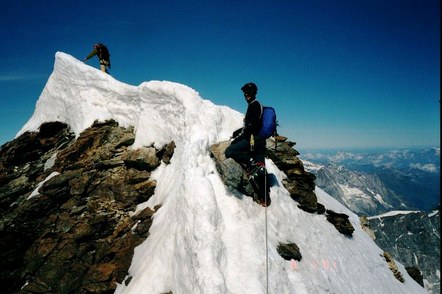Intermediate Alpine Climbing
Intermediate Alpine Climbing consists of a series of modules that combined teach the skills to lead climb the rock, snow, or ice typically found in the Cascade and Olympic mountains of the Pacific Northwest. In addition to climbing techniques, the course emphasizes leadership, safety, and climbing instruction. Course graduates will have the knowledge and skills to organize and lead basic-level climbs and to participate in intermediate-level alpine, rock, and ice climbs. These course modules are a good next step for those who have completed the basic climbing program and have gotten additional climbing and scrambling experience in addition to the basic climbing courses 2 required climbs. The Intermediate Climbing Course is also offered by the Everett, Foothills, Kitsap, Olympia, and Tacoma branches of The Mountaineers. Many intermediate students go on to successfully become climb leaders with The Mountaineers.
The Seattle intermediate program modules allow students to go at their own pace and focus on the type of climbing they are passionate about. In addition, this also allows for new entry points for students who already have some of the skills the intermediate course used to cover so they can jump right in wherever they are rather than having to re-learn skills they already possess.
The modules are a great way to focus your efforts on a more specific set of skills. For example, if you want to focus on doing more glacier and steep snow and ice consider taking Self Rescue I, Winter Mountaineering, and Intro to Alpine Ice. Or if you are more interested in rock consider taking Self Rescue I, Single Pitch Trad, Multi Pitch Trad, and Self Rescue II.
Got questions after reviewing this page? Email at intermediate.climbing@gmail.com
MODULES AND CONTENT
- Winter Mountaineering & Advanced Crevasse Rescue (WMCR) (aka Intermediate Glacier Travel) includes winter mountaineering skills, trip planning, moving efficiently on moderate to steep terrain, advanced crevasse rescue techniques, group glacier travel techniques, and leadership
- Self Rescue I, focuses on the fallen follower scenario including escaping a loaded autolocking device, and counterbalance rappel to a tandem rappel.
- Single Pitch Trad Climbing teaches gear placement and gear spacing techniques and crack climbing in a single pitch environment.
- Multi Pitch Trad Climbing teaches leading on the gear in a multi-pitch setting including efficient transitions, gear anchors, multi pitch rappel considerations, etc.
- Intro to Alpine Ice Climbing teaches techniques for leading on alpine ice on moderate terrain (Grade II, up to 45 degrees)
- Self Rescue II cements the skills of the first rescue module and adds the fallen leader scenario
In addition to the lectures, practice sessions, and field trips, students will need to participate in Mountaineers-sponsored climbs both at the basic and intermediate levels in order to graduate from the intermediate climbing course package.
PrerequisitesEach module has specific prerequisites. In general, these include:
Winter Mountaineering & Advanced Crevasse Rescue (WMCR) Single Pitch Trad
Pre-reqs: leading on bolts outside at 5.7 or indoors at the gym (have gym lead card) usually means you are climbing at 5.9 inside Multi Pitch Trad
Pre-reqs: Single Pitch trad course or similar previous experience Alpine Ice Self Rescue I
Pre-reqs: you should be familiar with a full belay escape and lower and ideally you should have multi pitch trad experience since the scenarios are related to rescuing a climber on a multi pitch rock climb Self Rescue II
Pre-reqs: Self Rescue I, or a full understanding of rescuing a follower on a multi pitch climb which involves lowering, counter balance rappel, and tandem rappel. To be successful with multiple modules we recommend that students have a fairly extensive level of experience in hiking, backpacking, scrambling, and basic climbing. Here are some guidelines for what is expected:
|
Intermediate GraduationThe following requirements must be met to graduate from the full Intermediate Alpine Climbing Course:
In order to submit a complete application for graduation, students need to maintain a detailed record of their climbing activities as a student. Continuing Students: There will be no changes in graduation requirements for students already enrolled in the Intermediate Course as of 2017. The new course structure mirrors that of the Intermediate Course closely enough that students may substitute required intermediate field trips with the corresponding new modules. This typically applies to the Winter Mountaineering and Rescue Methods (now Self Rescue I and II) field trips. If you have completed your rope lead requirements, volunteering with the basic program and all the modules please email intermediate.climbing@gmail.com to apply for graduation from the full intermediate program. |
